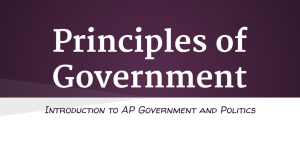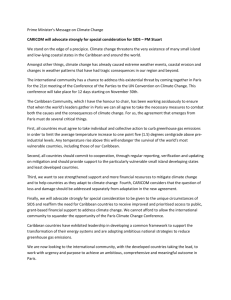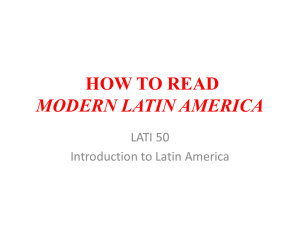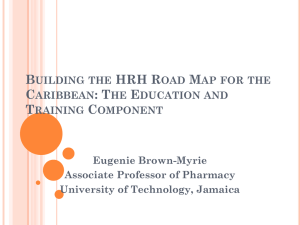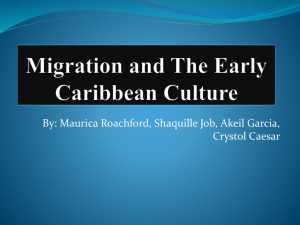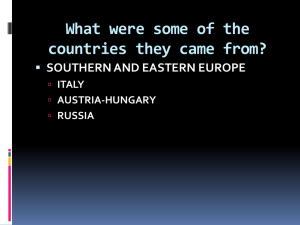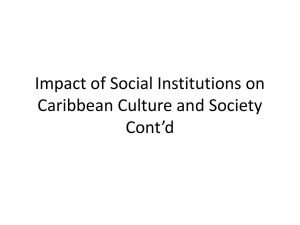Extra- Regional Influence on the Caribbean
advertisement
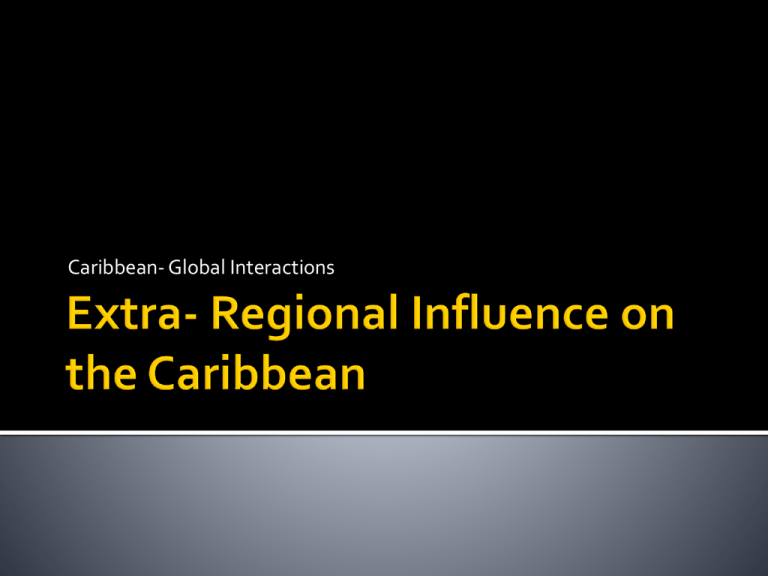
Caribbean- Global Interactions To assess the influence of extra-regional countries on economies, politics and identity in the Caribbean In 1960s and 1970s the Caribbean achieved independence from Britain The model of government introduced was the Westminster System This is a form of Parliamentary Government where the Head of Government ( or Prime Minister) depends on the parliamentary body for his or her position Executive Makes policies for ministries Legislature Judiciary Ensures that laws are fairly applied Makes the laws Government Separation of Power: government where the three arms have different kinds of authority and power, in order to minimize opportunities for abuse of power. This determine the kinds of elections and lays down rules and procedures First Past the Post/Simple Majority: Candidate who polls most votes wins the seat (therefore quite possible for party to win majority seats but not popular vote) Proportional Representation: number of seats gained by a party in a parliament is proportional to the number of votes polled. First Past the Post System Held every five years Island divided into 41 constituents by Election and Boundaries Commission Each political party will nominate candidates to contest the various seats Candidates usually campaign an hold public meetings. After election the candidate who gets the most voted in each constituency becomes a member of the house of representatives The member who commands the majority support in House of Representatives becomes Prime Minister. The person who commands the support of the largest number of members in opposition to the ruling party becomes Leader of the Opposition. The ruling party appoints Ministers to head various ministries A two chamber system which consists of the House of Representatives(Lower House), the Senate( Upper House) and the President. House of Representative consists of elected members Senate consists of appointed members chosen from the Ruling party, the Opposition and independent individuals chosen by the President. Proportional Representation and Uni-cameral legislature i.e only one House in Parliament. Entire country considered a single constituency It is a democratic system any number of political parties may contest the election After the votes are counted the seats in the legislative body are distributed in proportion to the number of votes cast for various parties There is no clear Separation of Power between the Executive(HOG,Cabinet,Committees) and the legislature. ( This compromises democracy because the prime minister becomes all powerful, and it elevates one political party to receive all rewards). Politics developed along Ethnic and Partisan Lines Prime Ministers and political parties holding on to power for years on end, thus excluding other groups. People vote every five years but there are few opportunities to participate on issues affecting the country. True participation of all social classes and ethnic groups is not encouraged. There are numerous calls for constitutional reform and power sharing The postcolonial reality is that all groups are organizing and mobilizing so that they have voice and representation. The understanding that governments and their agents must act in accordance with the established legislative framework of a country. It is meant to: curb arbitrary acts, enforce equality before the law, and preserve law and order. Examples where the rule of law was compromised. 1970s Black Power and 1990s Black Muslim Political uprisings in Trinidad and Tobago. Take over of Grenada by Maurice Bishop in 1979 A similar structure with 4 levels of preprimary, primary, secondary and tertiary. Until recently school leaving certificate based on British General Certificate of education Advanced level Subject were based on GCE exams in Cambridge and London, England. North American System encroaching- Use of GPA, Community Colleges concept. Caribbean Migrants and their children live and work in metropolitan countries. Remittances constitute a valuable source of foreign exchange Has helped Caribbean countries by lessening the pressure for jobs an social services. Makes the Caribbean more vulnerable to the policies of extra- regional countries. The US forced to take seasonal semi-skilled workers since their own residents are unwilling to work The brain drain Effect through the emigration of skilled people, most of whom were trained in the Caribbean The experience of racism in the metropolitan country and being treated as second-class citizens. The mindset that better opportunities lie with extra-regional countries. Injustice felt by seasonal worker who are segregated from resident communities on larger farms. Continues the syndrome of Dependency Examples Sugarcane fields of Southern Florida Orchard of the Niagara Peninsula in Canada.



